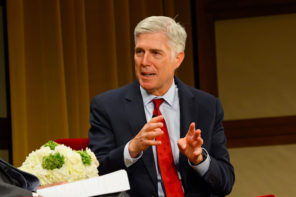Americans United for the Separation of Church and State has written a letter to acting IRS Commissioner Daniel Werfer, urging him to act on a long-languishing procedural change that could revitalize the agency’s enforcement of a law prohibiting politicking from the pulpit.
AU’s action was prompted by proposed rule changes at the IRS that could clarify the rules limiting politicking by social welfare organizations with tax exempt status under section 501(c)(4) of the Internal Revenue Code. Those changes were set in motion after record amounts of campaign spending by (c)(4) groups in 2012, and tea party complaints that their applications for (c)(4) status were improperly denied for partisan reasons. Although Congressional Republicans tried to make a scandal of the application process, further congressional investigation showed both conservative and progressive applicants were scrutinized for possible political activity, and that there was no partisan motive.
Churches and other houses of worship, whose tax exempt status is under section (c)(3) of the Internal Revenue Code, risk their tax-exempt status if they use tax-exempt resources to endorse political candidates. Although the law is clear, no audits have been initiated since 2009, after a federal court ordered the agency to issue regulations clarifying requirements that audits of churches be authorized by an “appropriate high-level Treasury official.”
During the uproar over the supposed IRS targeting of tea party groups, conservative Christian groups tried to claim that they, too, were targeted by the IRS for their religious beliefs. IRS movement on the audit procedures will likely trigger more complaints from conservative legal and religious groups that the agency is attempt to stifle their free speech. Through efforts such as Pulpit Freedom Sunday, pastors openly flout the law. Enforcement of the rule, and the revocation of a partipating church’s tax-exempt status, though, could trigger a constitutional challenge to it.
The rule against politicking, though, isn’t aimed at suppressing free speech but at ensuring that taxpayers don’t subsidize political activity by tax-exempt religious organizations.
The next Pulpit Freedom Sunday is scheduled for October 5, 2014, just before the midterm elections. The website for the event, a project of the Christian right legal firm Alliance Defending Freedom, claims “the future of religious freedom depends on a free pulpit to communicate fundamental, biblical principles to congregations across America” and urges pastors to “join a growing movement of bold pastors preaching Biblical Truth about candidates and elections from their pulpits.”
In AU’s letter, executive director the Rev. Barry Lynn argues that “it would be detrimental for our country and the democratic process to go through another election cycle with the ‘no-politicking’ rule unenforced.”
But ADF appears determined for a showdown. Its website notes that Pulpit Freedom Sunday grew from 33 participants in 2008 to 1,621 in 2012. And ADF has offered to represent any pastor investigated by the IRS free of charge.




